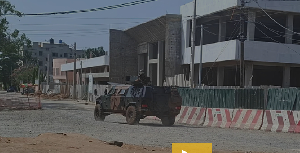Do we really know the recidivism rate of our prisoners in your prison custody?
I know there are a lot of people who share the philosophy of idealists because they will always want to do things differently. Indeed, I share the views of this philosophical school of thought because the idealist is thinking differently of how the world can be made a better place for all.
With the soaring unemployment rate and the ever increasing pressure on the government to provide social needs for the people, I know a call for critical look at the prison system in Ghana is surely going to earn me more jeers than cheers.
After all, prisons are habitat for miscreants in the society. But the million dollar question is; how have we made our incarcerated population and the Prison system useful such, that it can transform the inmates to be productive to themselves and the society?
I don?t really know if there has been any extensive study done on Ghana?s Prison system and its recidivism rate. So it is very difficult for me to assess the Prisons Service. Nevertheless, I have the feeling that just like our other neglected institutions, there is not too much to write home about.
Nevertheless, I would like to add a new dimension to the system. For one thing is clear: Prisons are not designed to reform or rehabilitate the prisoners or the offenders. It is a fact that most of the people who go to prisons come back to the streets worse than before. In other words, they acquire all sorts of behaviors while in prison. The best we can hope for as a society is for the prison service to design a ?system? to prepare the prisoners to have social and economic skills which can be used once they come out of the prison. The fact is that Prisons are built to temporally protect the society from known criminals. Those who are not known or have not been caught still live in the society.
With that in mind we need a very strong Parole system which can monitor the ex-convicts once they come out of the prison custody. A Parole system can assist the Prisons? officers to access the rate of reformation of prisoners- most especially first offenders. The idea is to keep and monitor progress of reformation so that those who have genuinely reformed could be made to join the society earlier than expected. The move is to among other things decongest the prisons population. But to prevent them from taking advantage of their ?freedom? the parole board can still monitor their activities and movements outside the walls of the prisons.
A GPS system can track the parolees? movement. Elsewhere it is called ?being-on-the-box.? Literally it is not a Prison and it is not complete freedom too. It is something in between.
The ?box? is a four-pound electronic device that resembles a transistor radio. This device informs the parole officers exactly where a parolee is and the exact time. It calculates his or her location using (GPS) Global Position System?a network of 24 satellites hovering above the earth.
This is how it works: A parolee wears a wireless bracelet locked around his or her ankle which transmits a signal to the box which is monitored. When a parolee leaves the house to go out to the neighborhood store for example, he or she has to remember to stay within hundred feet of the main box. If he or she stays away from the box too far or abandon the box completely he or she would be violating the parole terms and could be sent back to Prison without any negotiation.
The good thing about this system is that, it is a prison without- walls?a virtual jail. The GPS device allows the parole officers to check up on an offender at any time. It can also allow the Prisons to release first time offenders to finish up their term at home in order to create room for the hard core criminals. The threat to society of course is not the kleptomanias rather the hard core criminals.
For our ex-prisoners to be fully integrated into the society there is the need to provide job training in marketable skills as well as psychological counseling services both inside and outside the Prison. Also, there should be Release Orientation programs to prepare the prisons for the real world. Last but not the least, there is the need to establish Institute for Prisons System Studies (IPSS) in at least one of our Universities.
As we embark on our economic development, our criminal elements will grow. There is the need to manage the few deviants who will like to make life unbearable for the majority. We cannot develop economically without complimentary social development plans. It is a big risk to be so immersed in economic development without other elements. The security of the State and that of the individuals should be very paramount on our developmental agenda. I don?t have all the answers, but I write to raise questions which are intended to generate debates. What do you think?
Kwaku Adu-Gyamfi.
NJ USA
Email: Asuomgag@hotmail.com
Opinions of Sunday, 10 February 2008
Columnist: Adu-Gyamfi, Kwaku














